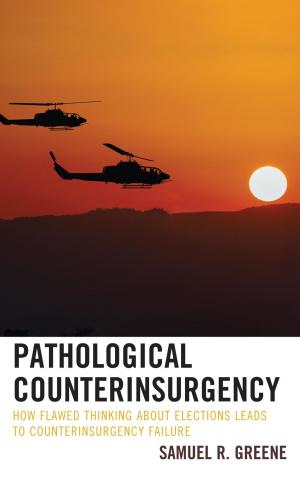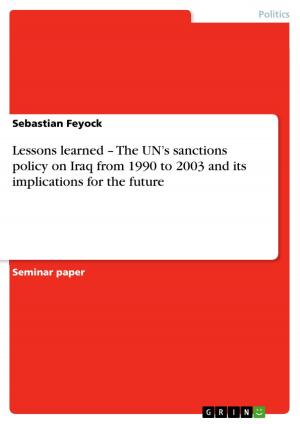World War III
A Military Analysis
Nonfiction, Social & Cultural Studies, Political Science, International, International Security| Author: | Dr Marek Laskiewicz | ISBN: | 9781871771213 |
| Publisher: | Krzenwic | Publication: | January 1, 2015 |
| Imprint: | Language: | English |
| Author: | Dr Marek Laskiewicz |
| ISBN: | 9781871771213 |
| Publisher: | Krzenwic |
| Publication: | January 1, 2015 |
| Imprint: | |
| Language: | English |
The book briefly presents the underlying nation polityst political science theory in Chapter 2 and the consequent prediction of Russia’s probable future in Chapter 3. This is the background for the military analysis. Chapter 4 then reviews Russia’s military capabilities compared to others in the world. This shows her geomilitary capabilities. The war in itself is now analysed and predictions made. This is the heart of the book, Chapters 5 to 9. These state that contrary to previous and current military thinking, graduated deterrence doctrine actually provides the route to world termination. It is not a way of avoiding nuclear war as was thought when it was presented, but a slow but sure route of gradual escalation because each stage is actually a step downwards yet perceived to be only a minor intensification, hence can be taken lightly, maybe even thoughtlessly; thus each stage is then seemingly a merely minor escalation. Moreover the world has changed since this doctrine was first drawn up. It is a global village, so the war would naturally extend so as to engulf the whole world. Furthermore the world has speeded up, so now the war may well be over in a few months, maybe a few weeks or even days, perhaps literally in an afternoon. In particular Chapter 5 states that there are no military, political or psychological barriers to war, an analysis that history confirms, thus this is indeed our probable future. So MAD [Mutually Assured Destruction] will not stop a world war from breaking out either, again contrary what its proponents thought and the world believes in to this day. Therefore as stated in Chapters 10 to 13, the world is facing its demise: this war, if fought, will destroy the world so that no meaningful progress, maybe even no existence, occurs afterwards. It is also predicted that the war would bring in its train consequent disasters as yet unforeseen by anyone, namely famine, disease, in particular a pandemic, and maybe further minor wars over what resources remain. Chapter 11 formally states that our probable future is therefore world termination. Next ways of avoiding this war are considered in Chapter 14. They are ultimately all political, so this book has little to say as purely military solutions at present do not exist. Finally the world’s situation today is analysed. After this the conclusion scarcely needs to be spelt out, namely that the world will probably soon be terminated, but is nonetheless presented for the sake of completeness. The third world war itself will probably go through four stages with several ministages, namely the Re-gathering Wars, the NATO War, the WMD War, and the Termination War. The world may already be in the first stage as these wars are for the West phoney wars, indeed at present TV wars. The thesis is presented in the important chapters in the book: 2 Politics 3 Current Military Situation 4 Geomilitary 5 World War III Overview 6 Prelude to World War III 7 Conventional World War III 8 Nonconventional World War III 9 WMD World War III 10 Outcomes Overview 11 World Termination 12 Post-World War III World 13 Other Futures Improbable 14 War Avoidance 15 The World Today There also a few illustrative figures: Diagram 1: Theoretical analysis of Russia’s future Table 1: Russia in the World Table 2: World War III Military Stages Table 3: World War III Military Ministages Table 4: World War III Outcomes.
The book briefly presents the underlying nation polityst political science theory in Chapter 2 and the consequent prediction of Russia’s probable future in Chapter 3. This is the background for the military analysis. Chapter 4 then reviews Russia’s military capabilities compared to others in the world. This shows her geomilitary capabilities. The war in itself is now analysed and predictions made. This is the heart of the book, Chapters 5 to 9. These state that contrary to previous and current military thinking, graduated deterrence doctrine actually provides the route to world termination. It is not a way of avoiding nuclear war as was thought when it was presented, but a slow but sure route of gradual escalation because each stage is actually a step downwards yet perceived to be only a minor intensification, hence can be taken lightly, maybe even thoughtlessly; thus each stage is then seemingly a merely minor escalation. Moreover the world has changed since this doctrine was first drawn up. It is a global village, so the war would naturally extend so as to engulf the whole world. Furthermore the world has speeded up, so now the war may well be over in a few months, maybe a few weeks or even days, perhaps literally in an afternoon. In particular Chapter 5 states that there are no military, political or psychological barriers to war, an analysis that history confirms, thus this is indeed our probable future. So MAD [Mutually Assured Destruction] will not stop a world war from breaking out either, again contrary what its proponents thought and the world believes in to this day. Therefore as stated in Chapters 10 to 13, the world is facing its demise: this war, if fought, will destroy the world so that no meaningful progress, maybe even no existence, occurs afterwards. It is also predicted that the war would bring in its train consequent disasters as yet unforeseen by anyone, namely famine, disease, in particular a pandemic, and maybe further minor wars over what resources remain. Chapter 11 formally states that our probable future is therefore world termination. Next ways of avoiding this war are considered in Chapter 14. They are ultimately all political, so this book has little to say as purely military solutions at present do not exist. Finally the world’s situation today is analysed. After this the conclusion scarcely needs to be spelt out, namely that the world will probably soon be terminated, but is nonetheless presented for the sake of completeness. The third world war itself will probably go through four stages with several ministages, namely the Re-gathering Wars, the NATO War, the WMD War, and the Termination War. The world may already be in the first stage as these wars are for the West phoney wars, indeed at present TV wars. The thesis is presented in the important chapters in the book: 2 Politics 3 Current Military Situation 4 Geomilitary 5 World War III Overview 6 Prelude to World War III 7 Conventional World War III 8 Nonconventional World War III 9 WMD World War III 10 Outcomes Overview 11 World Termination 12 Post-World War III World 13 Other Futures Improbable 14 War Avoidance 15 The World Today There also a few illustrative figures: Diagram 1: Theoretical analysis of Russia’s future Table 1: Russia in the World Table 2: World War III Military Stages Table 3: World War III Military Ministages Table 4: World War III Outcomes.















